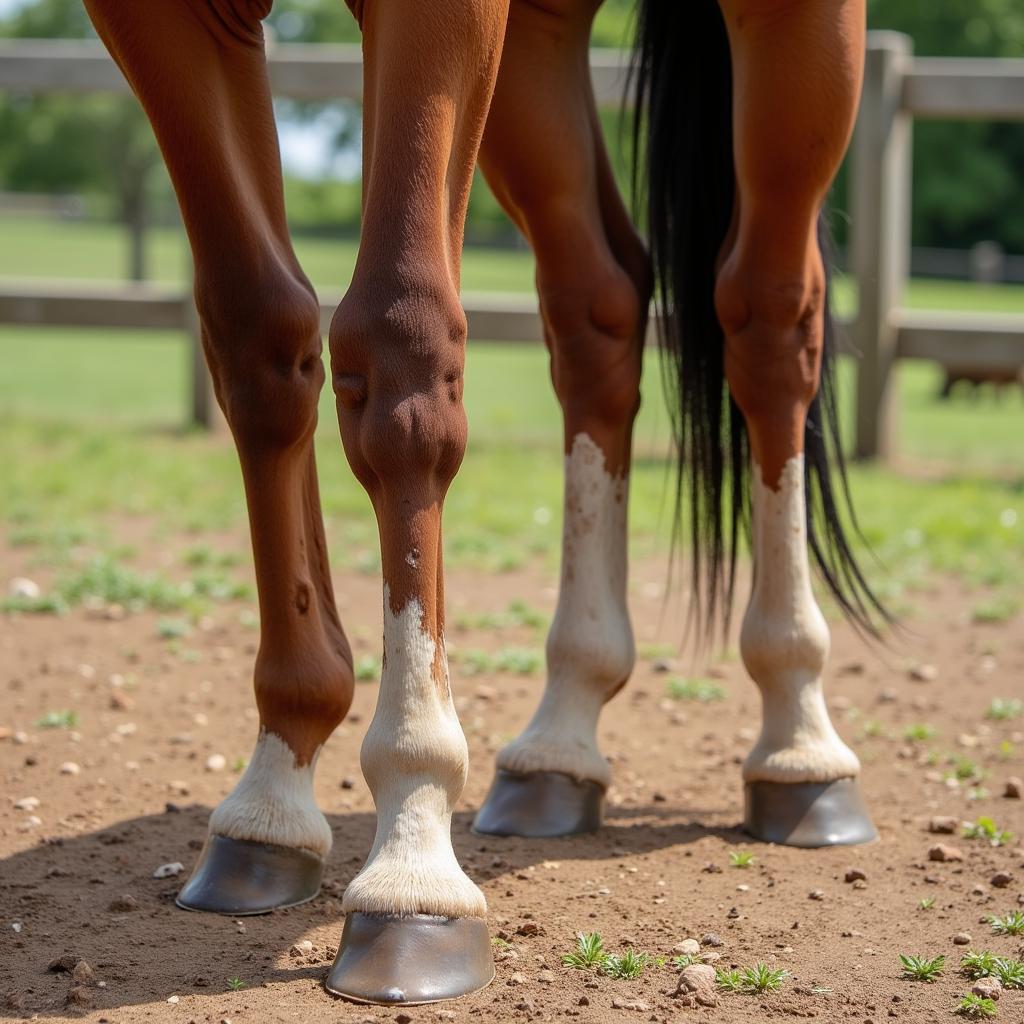Vitamin D plays a crucial role in the overall health and well-being of horses, just as it does in humans. It’s essential for calcium absorption, bone development, muscle function, and immune system regulation. Ensuring your horse receives adequate vitamin D is a key aspect of responsible horse ownership.
Understanding the Importance of Vitamin D for Horses
Horses primarily obtain vitamin D through exposure to sunlight. When sunlight interacts with the horse’s skin, it triggers the conversion of a precursor molecule into vitamin D3, the active form of vitamin D in horses. This vitamin D3 is then metabolized in the liver and kidneys to its most active form, calcitriol, which regulates calcium and phosphorus absorption in the gut.
However, factors like limited sunlight exposure during winter months, stabling practices, and coat color can influence a horse’s ability to synthesize sufficient vitamin D. For example, horses with dark coats require longer sun exposure compared to lighter-colored horses to produce the same amount of vitamin D. vitamin e powder for horses can be beneficial for horses as well.
Signs of Vitamin D Deficiency in Horses
Recognizing the signs of vitamin D deficiency is important for early intervention. While not always obvious, some common indicators include:
- Weakened Bones: Vitamin D deficiency can lead to rickets in young horses and osteomalacia in adult horses, both characterized by soft and weakened bones.
- Muscle Weakness: Vitamin D plays a role in muscle function, and a deficiency can manifest as muscle weakness, tremors, or stiffness.
- Poor Growth: In young horses, inadequate vitamin D can stunt growth and development.
- Increased Susceptibility to Infections: Vitamin D supports the immune system, and a deficiency can make horses more prone to infections.
 Horse displaying signs of potential vitamin D deficiency
Horse displaying signs of potential vitamin D deficiency
Meeting Your Horse’s Vitamin D Requirements
While sunlight is the primary source of vitamin D, providing supplemental vitamin D through fortified feeds or supplements can be necessary, especially during periods of limited sunlight. vitamin e for horses liquid can also be a valuable supplement for overall equine health.
How Much Vitamin D Does a Horse Need?
The exact vitamin D requirement for horses varies depending on age, activity level, and other factors. Consult with your veterinarian to determine the appropriate dosage for your horse. Over-supplementation can be harmful, so it’s crucial to follow professional advice.
Choosing the Right Vitamin D Supplement
Various vitamin D supplements are available for horses, including powders, pellets, and injectables. When selecting a supplement, look for high-quality products from reputable manufacturers. Discuss the best options with your veterinarian based on your horse’s individual needs.
Vitamin D and Forage: The Connection
The vitamin D content of forage can vary depending on factors like the type of forage, harvesting time, and storage conditions. Sun-cured hay generally contains higher levels of vitamin D compared to hay dried indoors. Understanding the vitamin D content of your horse’s forage can help you determine whether supplementation is necessary. A vitamin and mineral block for horses can be a convenient way to provide supplemental nutrients, but it shouldn’t be the sole source of vitamin D.
“Providing balanced nutrition is crucial for equine health. Don’t overlook the importance of vitamin D, especially for horses with limited sunlight exposure.” – Dr. Emily Carter, Equine Nutritionist
Conclusion
Vitamin D is a vital nutrient for horses, supporting bone health, muscle function, and immune system strength. While sunlight is the primary source, supplementation may be necessary to ensure adequate intake, especially during winter or for stabled horses. Consulting with a veterinarian is crucial for determining the right approach to meet your horse’s individual vitamin D needs. By understanding the role of vitamin D and taking proactive steps, you can contribute to your horse’s overall health and well-being. Just as 5000 iu vitamin e for horses can be essential, proper vitamin D intake is crucial. vitamin e for horses with epm can also be helpful in certain situations.
FAQ
- Can horses overdose on vitamin D?
- What are the best sources of Vitamin D For Horses?
- How can I tell if my horse is vitamin D deficient?
- Is sunlight enough for my horse’s vitamin D needs?
- What are the long-term effects of vitamin D deficiency in horses?
- Are there specific breeds more prone to vitamin D deficiency?
- How often should I supplement my horse with vitamin D?
Need help with your horse’s vitamin D needs? Contact us: Phone: 0772127271, Email: [email protected] or visit us at QGM2+WX2, Vị Trung, Vị Thuỷ, Hậu Giang, Việt Nam. We have a 24/7 customer support team.